
February 21, 2026
How to Prevent Keloid Scars After Surgery A Definitive Guide
Discover how to prevent keloid scars after surgery with our definitive guide. Learn expert strategies for risk assessment, surgery, and post-op scar care.
Oct 26, 2025
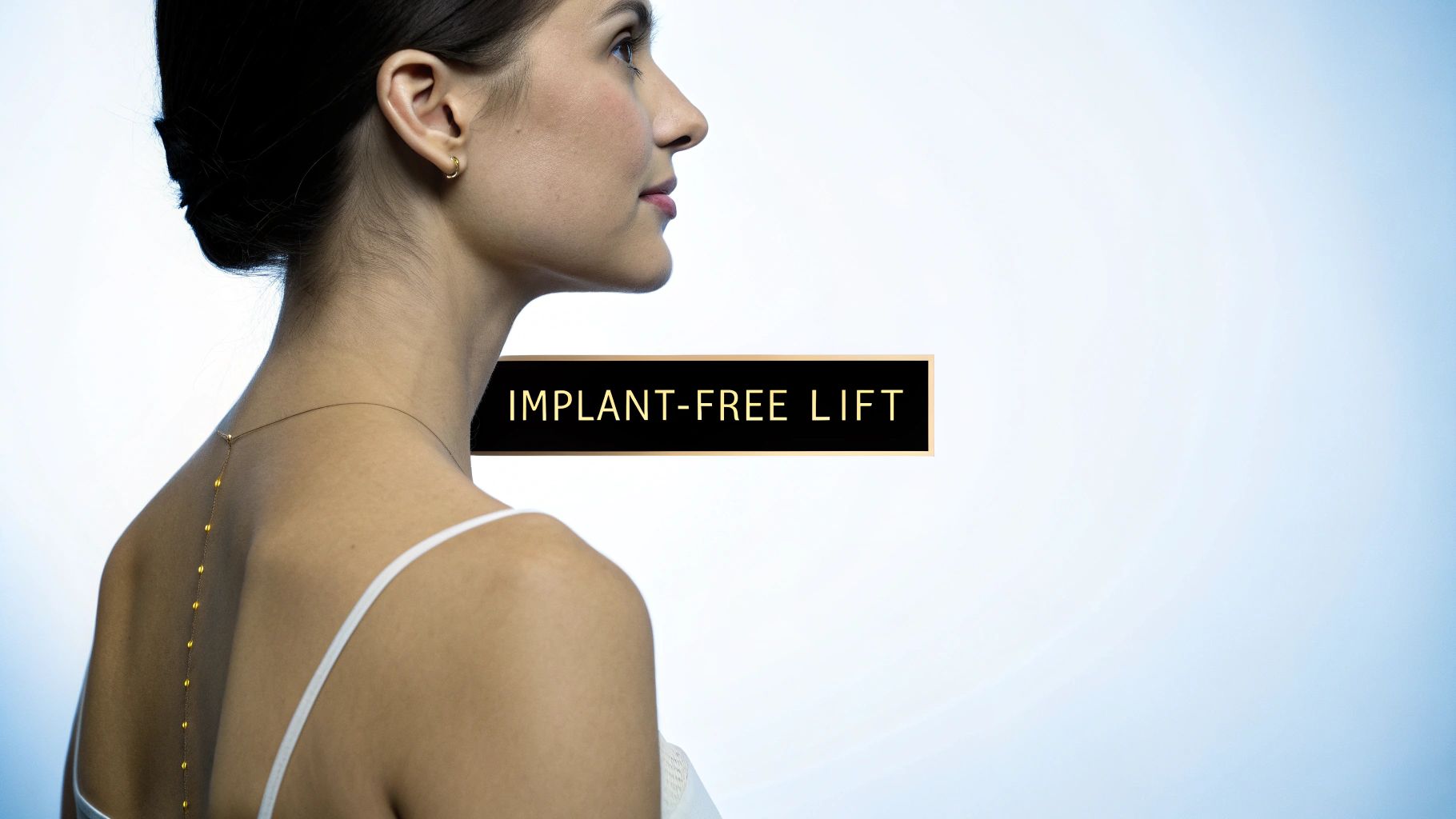
A breast lift without implants is a surgical procedure, medically known as a mastopexy, that lifts and reshapes the breasts by working exclusively with your own natural tissue. Instead of adding volume, the focus is squarely on restoring a youthful, perky contour by removing excess skin and tightening the surrounding tissue.
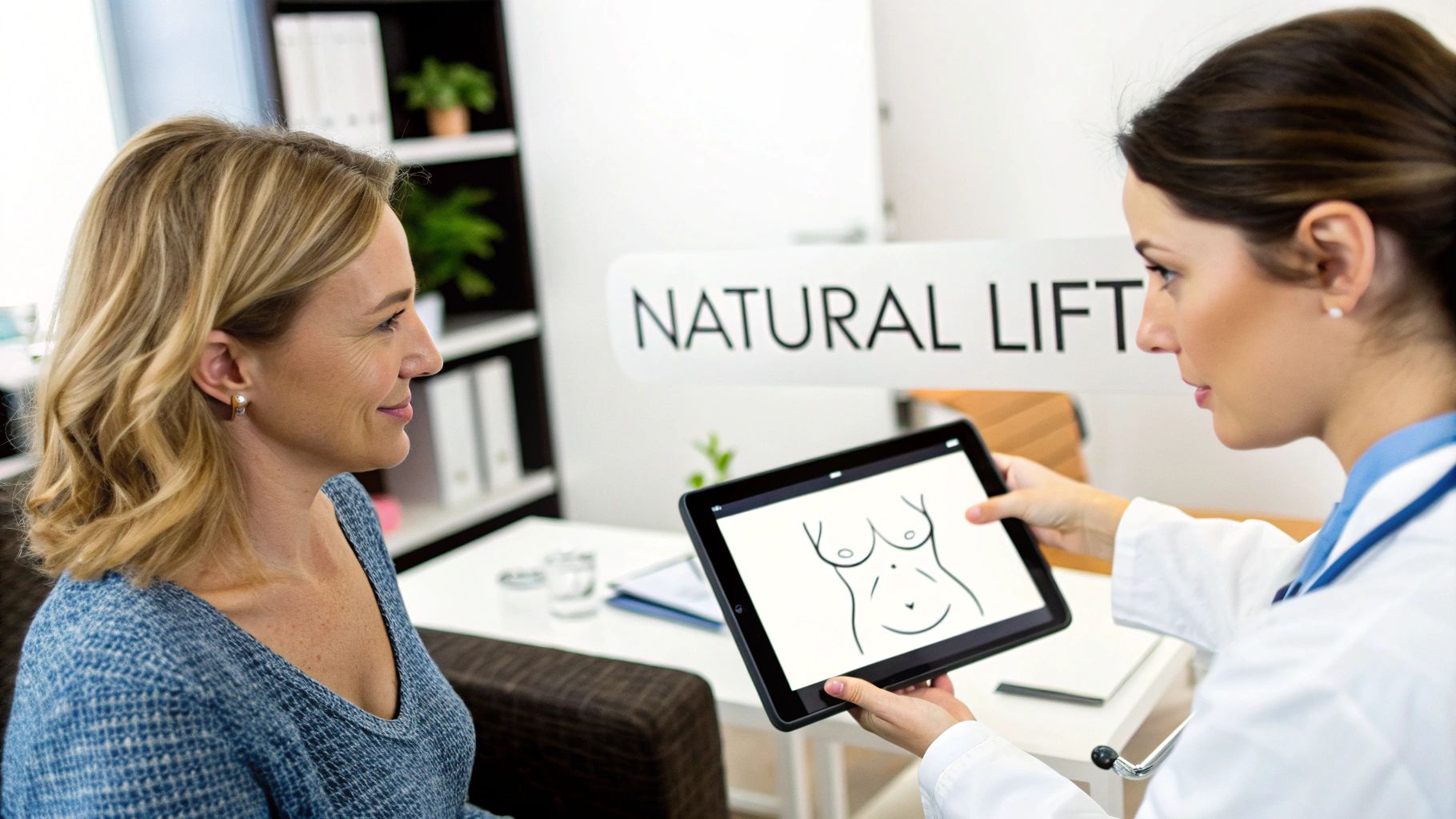
Think of it like a master tailor taking in a favorite dress that has stretched out over time. The goal isn’t to change the dress into something new but to bring back its original, flattering fit. A breast lift without implants follows that same idea, correcting what surgeons call breast ptosis (sagging) to create a much more aesthetically pleasing silhouette.
This procedure is a fantastic option for women who want a natural-looking enhancement. Many find themselves considering a lift after their bodies have gone through significant changes. Some of the most common reasons include:
The main goal here is rejuvenation, not augmentation. Your surgeon skillfully removes the stretched, excess skin, tightens the internal breast structure, and repositions the nipple and areola higher up on the breast mound where they used to be. This complete reshaping process dramatically improves symmetry and brings back that firm, rounded look.
The entire philosophy behind a mastopexy is to work with what you already have. By refining the existing breast tissue and skin, the procedure creates a lifted and more youthful profile without introducing any implants.
This focus on enhancing natural beauty is why the procedure is becoming so popular worldwide. The market for mastopexy was valued at around USD 1.75 billion and is expected to grow to USD 2.92 billion by 2033. This surge shows a clear trend: people want cosmetic improvements that celebrate and restore their own anatomy. It’s an ideal solution for anyone who is perfectly happy with their breast size but just wants to correct sagging and get a major confidence boost.
It's easy to get these two procedures confused, but their goals are quite different. Here's a quick breakdown to help clarify what each one is designed to achieve.
Ultimately, a breast lift without implants is for reshaping, while a traditional augmentation is for resizing. Many patients even combine the two procedures to get the benefits of both—a lift and added volume.
Deciding on any cosmetic surgery is a huge step, and figuring out if a particular procedure lines up with your goals is the most critical part of the process. A breast lift without implants can be a fantastic option, but it's not a one-size-fits-all solution. The best candidates aren't just looking to fix sagging; they have the right physical starting point for a result that will look great and last for years.
The first step is a frank look in the mirror. Are you generally happy with the amount of breast tissue you have, but just wish it was higher up and perkier? If that sounds like you, then you're on the right track. This surgery is all about lifting and reshaping what you already have, not adding volume.
When I meet with a patient, the first thing I assess is whether they have enough natural breast tissue to create a beautiful new shape. Think of it like a sculptor working with clay. If there's enough material, a skilled surgeon can mold it into a rounder, more youthful breast. But if significant volume has been lost—often after weight loss or pregnancy—there might not be enough "clay" to build the desired projection.
Skin quality is the next big piece of the puzzle. Good skin elasticity is everything. It’s like a high-quality pair of jeans with great stretch that snaps right back into shape. We test this by gently pinching the skin; if it bounces back quickly, that’s a very positive sign.
This "snap-back" quality is vital because the skin has to support the newly lifted breast tissue. When your skin is firm, the results of your lift are far more likely to hold their shape over the long haul. On the other hand, poor elasticity—often due to genetics, sun damage, or smoking—means the skin may start to sag again over time.
Life changes things, and the appearance of our breasts is no exception. Most of my patients start considering a lift after going through one of these major life events:
Seeing real-life examples can be incredibly helpful. Looking through galleries of a breast augmentation before and after can give you a better sense of what's possible with modern cosmetic breast surgery.
For some patients, a specialized technique called an 'auto-augmentation' is the perfect fit. This isn't your standard lift. Here, the surgeon cleverly uses your own breast tissue, repositioning it higher on the chest to create fullness in the upper part of the breast. It's like getting a mini-augmentation using only what you already have. This is an amazing option for women who have plenty of tissue and good skin but want that upper-pole fullness without implants.
Being honest about your health and lifestyle is just as important as the surgery itself. A successful outcome is a team effort between you and your surgeon.
A great result is a partnership. Understanding your own body, motivations, and the procedure's limitations is just as crucial as the surgeon's skill.
There are a few situations where this procedure might not be the right choice, or at least, not right now:
Getting a feel for how a surgeon actually performs a breast lift without implants is the first step toward feeling confident about your choice. A mastopexy isn't a one-size-fits-all operation; it’s a highly personalized procedure. Think of it like a master tailor working with a unique pattern—your body. The techniques they use are chosen specifically for your anatomy and what you hope to achieve.
The main difference between these techniques comes down to the incision patterns. Which one is right for you depends almost entirely on the degree of sagging (what we call ptosis) and how much excess skin needs to be removed. As a rule of thumb, more significant sagging requires a more involved incision to get the best lift and shape. This, of course, means there's a trade-off with the resulting scars.
This visual breaks down what surgeons look for when deciding on the best approach.
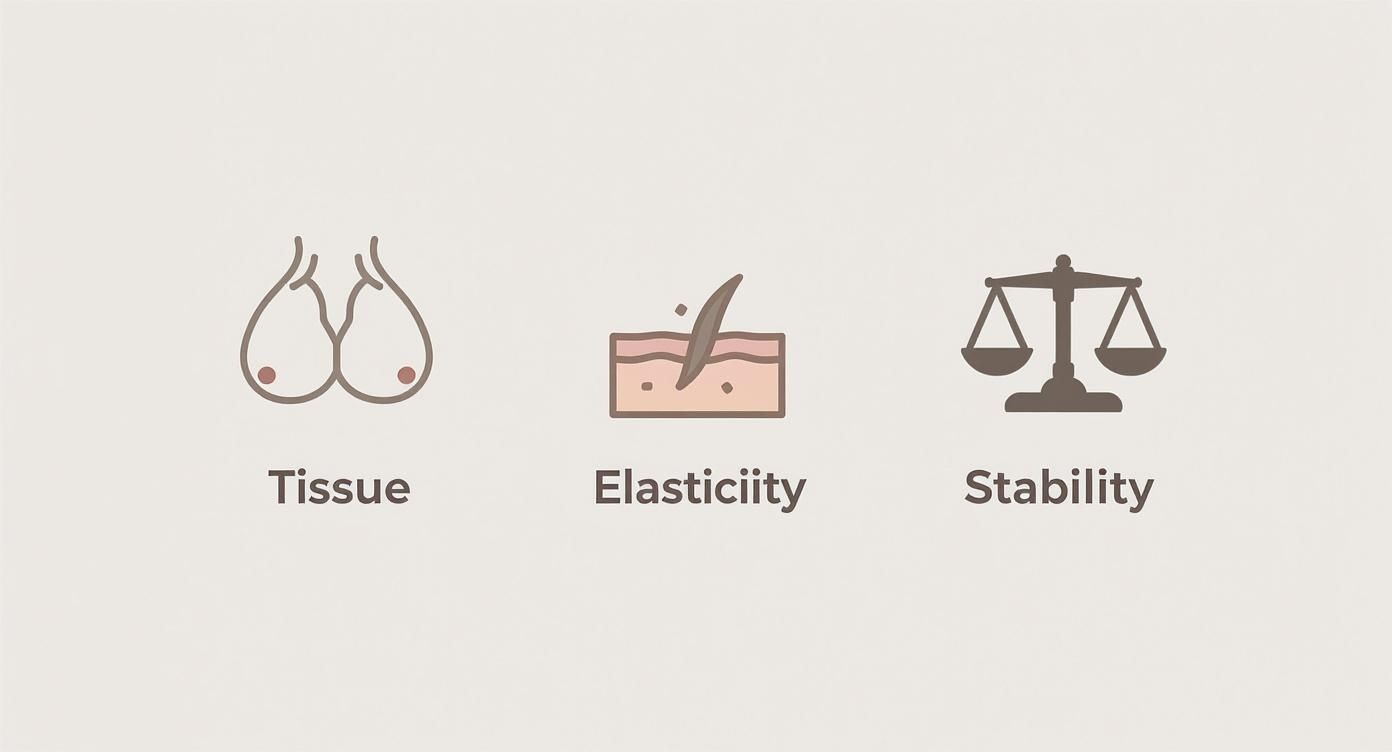
As you can see, the ideal foundation for a successful lift is a combination of having enough existing breast tissue, good skin elasticity, and being at a stable weight. When all three are in place, the results are not only beautiful but also long-lasting.
Surgeons rely on a few trusted incision techniques to lift and reshape the breast. Each one offers a different level of lifting power and is selected based on a patient's unique situation. Knowing what they are helps set clear expectations for your results and your recovery.
Here are the three most common approaches you'll hear about:
One of the most exciting techniques in the world of breast lift without implants is something called auto-augmentation. It’s a brilliant method where the surgeon uses your own breast tissue to create a fuller, rounder shape—almost like getting a tiny, natural implant.
Here's how it works: Instead of just removing the breast tissue that has sagged downward, the surgeon can strategically reposition a portion of it, moving it higher up on the chest wall. This internal reshaping trick adds volume to the upper part of the breast, which is often the area that looks "empty" or deflated after pregnancy or major weight loss.
Auto-augmentation is all about masterful rearrangement. By using your own tissue as a natural filler, a surgeon can enhance upper-pole fullness, creating a lifted and more projected breast contour without any foreign materials.
This is a game-changer for women who want a bit more fullness but are set on avoiding implants. It really is the best of both worlds—a powerful lift plus a subtle volume boost, all done using your body's own resources. Your surgeon can tell you if you have enough available tissue to be a good candidate for this specialized procedure during your consultation.
Knowing what to expect and how to prepare for your breast lift without implants can make a world of difference. It helps calm those pre-surgery jitters and really sets you up for a smoother, more successful recovery. Think of it less like a to-do list and more like a series of intentional steps to get your body ready for the procedure and healing process. It all starts with that crucial first consultation.
This initial meeting is where the magic begins. It's a frank, open conversation where you'll talk about your goals, look at before-and-after photos to get a realistic picture of the possibilities, and have a physical exam. Your surgeon will take a close look at your breast tissue, skin elasticity, and overall health to make sure you're a good candidate and map out the surgical plan that's right for you.
Once you and your surgeon are on the same page, the next step is getting the green light from a medical perspective. These aren't just hoops to jump through; they're essential safety measures that help prevent complications down the road. Your surgeon will give you a personalized plan, but it will almost certainly include these key steps.
You will likely need to:
How you live your daily life has a huge impact on how well you heal. Your surgeon will be pretty clear about making a few temporary lifestyle tweaks to give your body the best possible chance for a great recovery. It’s a bit like training for a marathon—you want to show up on race day in your best possible condition.
Preparing for surgery is an active partnership between you and your surgeon. The choices you make in the weeks leading up to your procedure directly influence the safety of the operation and the quality of your final results.
One of the biggest non-negotiables is to stop smoking and using all nicotine products at least four to six weeks before surgery. Nicotine is a major roadblock to healing because it constricts blood vessels, which can lead to serious complications. It’s also a good idea to maintain a stable weight, as big swings can alter your final results over time. For more tips on this, check out our in-depth guide on how to prepare for surgery.
The last piece of the puzzle is getting your home ready for a comfortable, stress-free recovery. You won’t be doing any heavy lifting or reaching for high shelves for a little while, so a bit of prep work goes a long way.
Here’s a quick checklist to get your space ready:
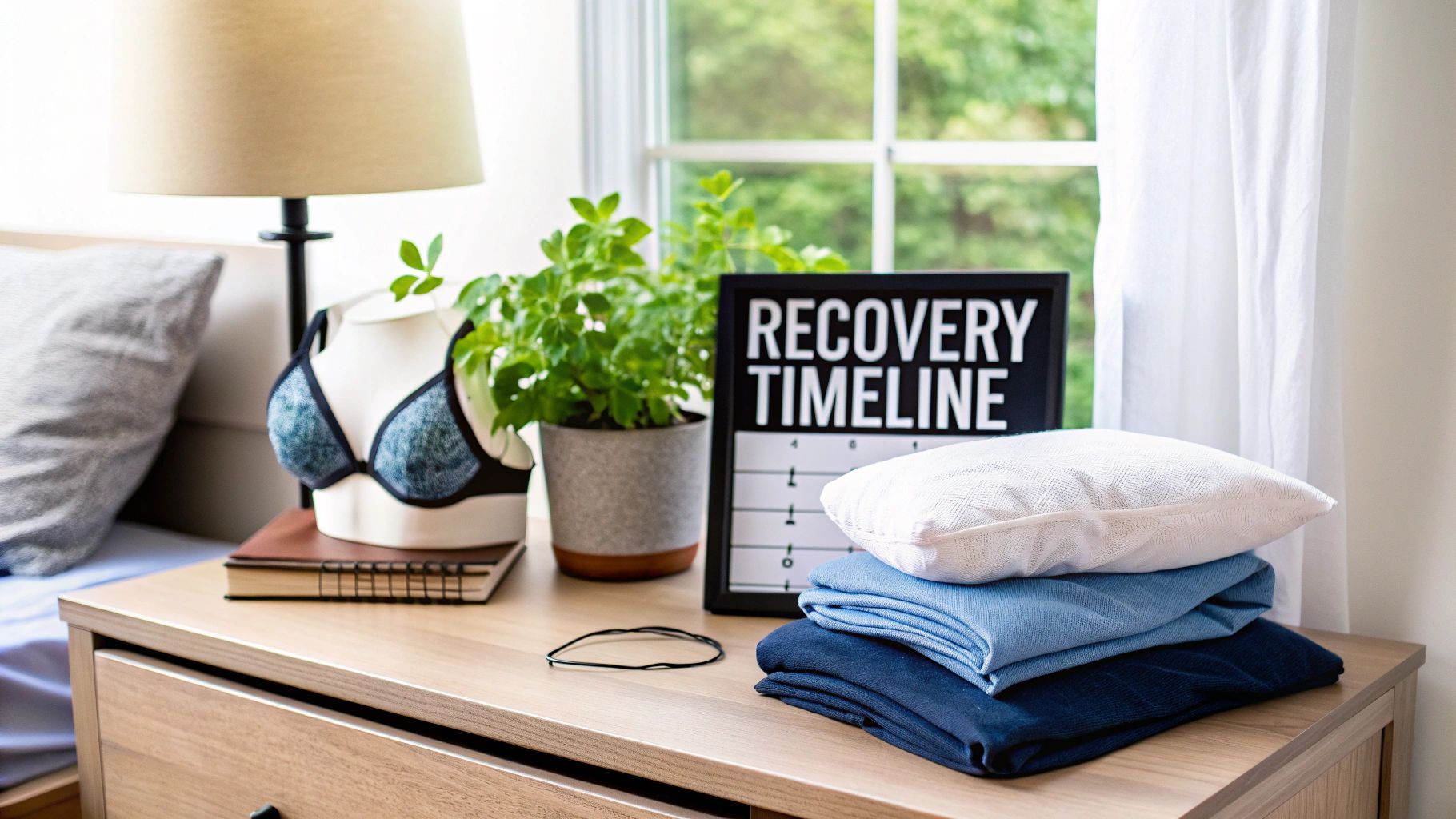
Knowing what’s around the corner after a breast lift without implants is one of the best ways to ensure a smooth, confident recovery. When you understand the healing journey, you can trade uncertainty for a clear focus on what truly matters: resting and letting your body do its work.
Recovery isn’t a single event; it’s a gradual process. Each week brings new progress, starting with dedicated rest and slowly transitioning into more mobility, until you finally see your beautiful new breast shape settle in. This timeline is your roadmap.
Those first two days are all about taking it easy. Your main job is simply to rest with your upper body propped up, which is key to keeping swelling down. Expect to feel sore, tight, and notice significant swelling—this is all a perfectly normal part of the process.
Your surgeon will give you a specific plan for managing any discomfort, usually with prescribed pain medication. You'll also be fitted with a supportive surgical bra to protect the area and help everything heal properly. It's crucial to have a friend or family member on hand during this time to help you with even the simplest tasks.
By the end of week one, you’ll likely feel a real shift. The swelling and bruising will still be there, but the initial soreness should have eased considerably. Many patients find they can switch from prescription pain medication to something over-the-counter.
You’ll also have your first post-op appointment this week. It's a chance for your surgeon to check on your incisions, make sure you're healing as expected, and update you on your aftercare.
Here's what to keep in mind for this first week:
Think of this initial recovery as a marathon, not a sprint. Sticking to your surgeon's activity restrictions is the most important thing you can do to prevent complications and help your incisions heal beautifully.
As you move past that first week, you'll start feeling more and more like yourself. The swelling will continue to go down, and you can slowly start adding light daily activities back into your routine. That supportive surgical bra is still your best friend—expect to wear it 24/7 for a few weeks to give your healing tissues the stability they need.
By the end of the month, many women feel ready to head back to a desk job and get back to most of their normal activities. Strenuous workouts, heavy lifting, and anything high-impact are still off the table, though. You'll start to see the early shape of your results, but remember your breasts will continue to soften and settle for months to come. For a more detailed guide, check out our post on essential recovery tips after plastic surgery.
Patience really is a virtue when it comes to surgical recovery. The final, settled results of your breast lift without implants will emerge somewhere between six and twelve months after your procedure. This is when the last of the swelling has vanished and your breast tissue has fully relaxed into its new position.
Your scars have their own healing timeline, too. At first, they'll look red and feel a bit raised. Over the course of a year, however, they will fade, flatten, and become much less noticeable. Following your surgeon’s scar care instructions—which might include silicone sheets or special gels—is vital. It’s also mandatory to keep your scars completely out of the sun for at least a year to prevent them from darkening permanently.
That first look in the mirror after a breast lift without implants is a powerful moment. Instantly, you’ll see your breasts sitting higher on your chest, looking perkier and more youthful than they have in years. The sagging is gone, replaced by a silhouette that feels more balanced and natural.
But it's not just about the lift. The procedure also completely reshapes your breast tissue, giving it a rounder, fuller contour. Many women are especially pleased with the improved symmetry—the surgeon carefully repositions the nipples and areolas to create a much more harmonious look.
It's crucial to remember that what you see right after surgery isn't the final product. Healing is a journey, not a sprint. Swelling is completely normal and will temporarily hide the beautiful new shape underneath.
Think of it this way: your body is a masterpiece in progress. The initial results are just a sneak peek. The true, refined outcome will gradually emerge over the next six to twelve months as the last bit of swelling disappears and your breast tissue settles softly into its new home.
Your scars will go through a transformation, too. At first, they'll likely be red and a little raised. But with time and good care, they'll flatten out and fade significantly, eventually becoming faint lines that are easily hidden under a bra or swimsuit.
A breast lift does an amazing job of turning back the clock on gravity and aging, but it can't stop time forever. How long your results last really comes down to a partnership between you, your body, and your lifestyle.
Several key factors will influence how long your new contour holds up:
While a breast lift can dramatically improve your confidence, many people also look into broader strategies to slow aging and achieve a more youthful appearance to feel their best overall. By keeping these factors in mind, you can protect your investment and enjoy your beautiful, natural-looking results for many years to come.
It's completely normal to have a lot of questions when you're thinking about cosmetic surgery. Getting clear, honest answers is the first step toward feeling confident and prepared for a breast lift without implants. Let's walk through some of the most common questions my patients ask.
My aim here is to give you the information you need to see the full picture, so you can make a decision that feels right for you.
This is a common concern, but a breast lift is all about reshaping and lifting, not reducing size. The goal is to work with the breast volume you already have.
That said, because the procedure removes loose, stretched-out skin and tightens your existing breast tissue into a higher, more youthful position, some women do find they go down a cup size. Think of it like a perfectly tailored dress—the amount of fabric is the same, but it fits your body in a much more flattering, contoured way. The focus is always on shape and position, not on taking away volume.
Scarring is an unavoidable part of any surgery, but a big part of a plastic surgeon's expertise is knowing exactly where to place incisions to make them as discreet as possible. The exact pattern and length of your scars will depend on the specific technique we need to use to get you the best lift.
A key part of the art in plastic surgery is placing incisions in places where they are easily hidden, like along the natural crease under the breast. This way, they are typically concealed by a bra or bikini top and fade into fine lines over time.
Following your aftercare instructions is absolutely essential for minimal scarring. Taking care of your incisions properly will help them heal beautifully.
For many women, yes, but it's not a 100% guarantee. Whether you can breastfeed afterward really depends on the surgical technique used and how much the milk ducts and nipple connections were adjusted during the procedure.
If you're thinking about having more children and hope to breastfeed, it is critical to discuss this with your surgeon during your very first meeting. Knowing this upfront allows them to choose a surgical approach that does everything possible to preserve your ability to breastfeed.
The cost of a breast lift without implants can differ quite a bit from person to person. The final price tag is influenced by a few key things: the surgeon's experience, how much work your specific case requires, and even the city where the practice is located.
Typically, the total cost will cover:
Because a breast lift is an elective cosmetic procedure, it's almost never covered by insurance. Be sure to ask for a detailed, all-inclusive quote so there are no surprises.
At Cape Cod Plastic Surgery, we are dedicated to helping you achieve your aesthetic goals with personalized care and exceptional results. To learn more about how a breast lift can restore your confidence, schedule your consultation with us today.

February 21, 2026
Discover how to prevent keloid scars after surgery with our definitive guide. Learn expert strategies for risk assessment, surgery, and post-op scar care.
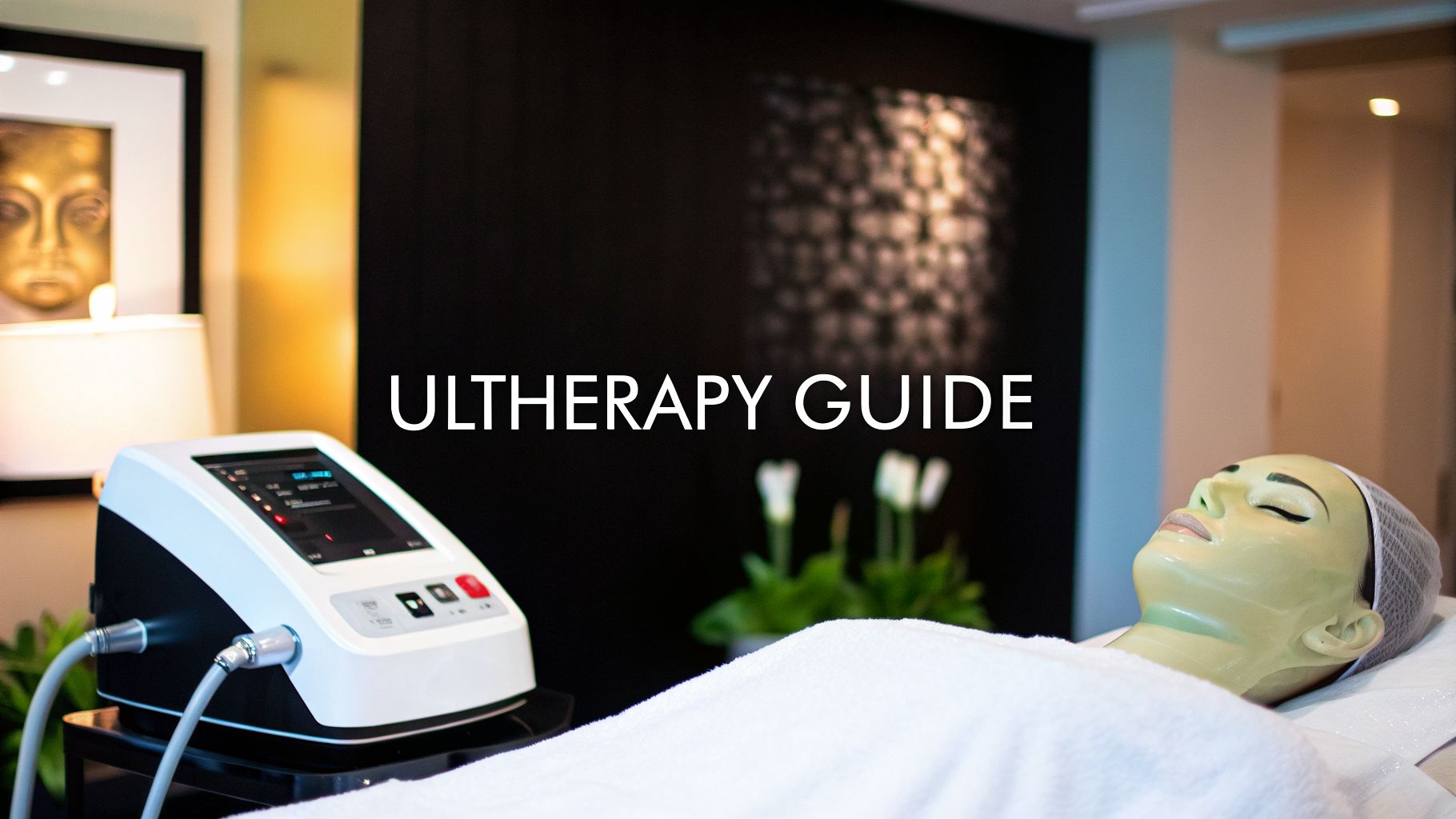
February 20, 2026
What is Ultherapy treatment? Explore this non-surgical facelift, how it uses ultrasound to lift skin, and what results you can expect from the procedure.

February 19, 2026
Explore stunning cheek filler before and after results. See real patient photos, learn about filler types, and discover what's possible for your facial contour.